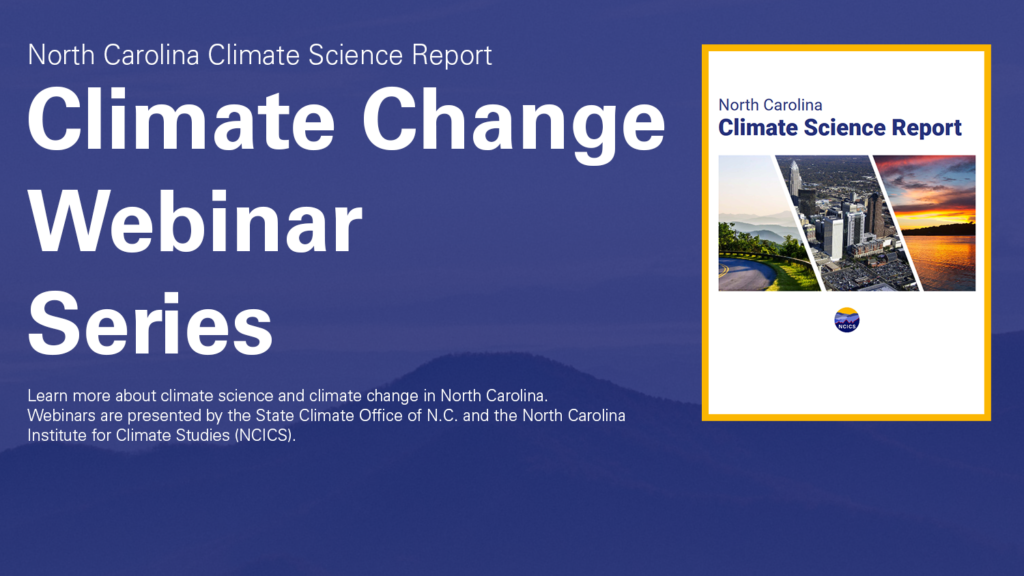WATCH: North Carolina Climate Change Webinar Series
go.ncsu.edu/readext?731769
en Español / em Português
El inglés es el idioma de control de esta página. En la medida en que haya algún conflicto entre la traducción al inglés y la traducción, el inglés prevalece.
Al hacer clic en el enlace de traducción se activa un servicio de traducción gratuito para convertir la página al español. Al igual que con cualquier traducción por Internet, la conversión no es sensible al contexto y puede que no traduzca el texto en su significado original. NC State Extension no garantiza la exactitud del texto traducido. Por favor, tenga en cuenta que algunas aplicaciones y/o servicios pueden no funcionar como se espera cuando se traducen.
Português
Inglês é o idioma de controle desta página. Na medida que haja algum conflito entre o texto original em Inglês e a tradução, o Inglês prevalece.
Ao clicar no link de tradução, um serviço gratuito de tradução será ativado para converter a página para o Português. Como em qualquer tradução pela internet, a conversão não é sensivel ao contexto e pode não ocorrer a tradução para o significado orginal. O serviço de Extensão da Carolina do Norte (NC State Extension) não garante a exatidão do texto traduzido. Por favor, observe que algumas funções ou serviços podem não funcionar como esperado após a tradução.
English
English is the controlling language of this page. To the extent there is any conflict between the English text and the translation, English controls.
Clicking on the translation link activates a free translation service to convert the page to Spanish. As with any Internet translation, the conversion is not context-sensitive and may not translate the text to its original meaning. NC State Extension does not guarantee the accuracy of the translated text. Please note that some applications and/or services may not function as expected when translated.
Collapse ▲The State Climate Office of North Carolina (SCONC) and the North Carolina Institute for Climate Studies (NCICS) have a new webinar series, explaining the impacts of climate change on North Carolina.
The series is based on the North Carolina Climate Science Report, released in early 2020 and revised in May 2020. NC State University’s NCICS led the development of the report.
- The sixth webinar, Talking About Climate Change (1:29:01) was presented on December 11, 2020 and is now available to view.
- The fifth webinar, Sea Level Rise (1:34:17), was presented on December 4, 2020 and is now available to view.
- The fourth webinar, Drought and Wildfires (1:32:18), was presented on November 5, 2020 and is now available to view.
- The third webinar, Hurricanes and Extreme Precipitation (1:33:33), was presented on October 20, 2020 and is now available to view.
- The second webinar, Warming Temperatures, Nighttime Warming, and Extreme Heat (1:33:54), was presented on September 25, 2020 and is now available to view.
- The first webinar, Overview of Climate Change in North Carolina (1:27:10), was presented on September 3, 2020 and is now available to view.
Future webinars will be recorded and recordings will be posted to the State Climate Office’s YouTube channel, and will be linked, along with relevant resources, on their Climate Change Webinar Series page.
If you have questions about the report or webinar series, please contact the State Climate Office at sco@climate.ncsu.edu.
About the North Carolina Institute for Climate Studies
The North Carolina Institute for Climate Studies (NCICS) is a unique center of excellence showcasing a partnership between universities, the private sector, non-profit organizations, community groups and the federal government.
As an inter-institutional research institute of the University of North Carolina system, NCICS facilitates climate-related research across the UNC system and its partner organizations. The NCICS is based in Asheville, NC.
About the State Climate Office of North Carolina
The State Climate Office of North Carolina (SCONC) is a public service center at NC State University dedicated to exploring climate-environment interactions in the state, with mission areas in extension, education, research and monitoring.
The SCONC is housed on Centennial Campus at NC State University in Raleigh, NC.



